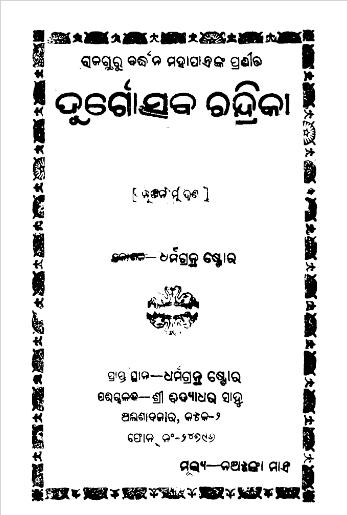Rajaguru Bardhana Mahapatra’s Durgotsaba Chandrika, published in 1904, is a poetic treasure rooted deeply in the cultural and spiritual fabric of Odisha. This work not only exemplifies the rich tradition of Odia literature but also serves as an intricate portrayal of the socio-religious milieu of his time.
At its core, Durgotsaba Chandrika celebrates the Durgotsava festival, an event dedicated to the worship of Goddess Durga. The festival is a vibrant confluence of devotion, artistry, and communal harmony, and Mahapatra captures its fervor and essence expertly through his verses. The poet’s love for the divine is palpable, as he invites readers to witness the grandeur of the goddess descending from her celestial abode to grace the earthly realm.
Mahapatra’s poetic style is rich in imagery, evoking visions of the intricate rituals and the dazzling decorations that characterize the festivities. He employs vivid descriptions that bring the festival to life — from the vibrant colors of the idols to the reverberating sounds of traditional music. Each stanza serves as a canvas, painting the ecstatic spirit of the devotees who come together to celebrate their culture and faith. The symbolism of Durga as a warrior goddess embodies the strength and resilience of women, a theme that resonates through the ages and remains pertinent in contemporary discussions about gender and empowerment.
The work transcends mere celebration; it delves into the philosophical underpinnings of the festival. Mahapatra interweaves stories from Hindu mythology, reflecting on the triumph of good over evil, a central tenet of the Durgotsava narrative. The goddess’s battles against various demons symbolize the inner struggles faced by individuals, reminding readers of the universal quest for virtue and justice. Through his poetry, Mahapatra not only honors the goddess but also encourages reflection on the moral implications of her victories.
Moreover, Durgotsaba Chandrika serves as a historical document, capturing the social dynamics of early 20th-century Odisha. The poet’s portrayal of communal participation illustrates the inclusive nature of the festival, where people from diverse backgrounds unite in reverence and joy. This unity in diversity is a critical theme, promoting a sense of belonging and collective identity amidst emerging socio-political changes of the time.
The legacy of Durgotsaba Chandrika extends beyond its immediate context, influencing generations of poets and writers in Odisha and beyond. Mahapatra’s lyrical prowess and deep understanding of cultural ethos resonate with contemporary audiences, reminding them of the inherent value of their heritage. His work is a precursor to modern Odia poetry that seeks to explore identity, spirituality, and social justice.
Books Info
| Books name | Durgotsaba Chandrika / ଦୁର୍ଗୋତ୍ସବ ଚନ୍ଦ୍ରିକା |
| Author | Rajaguru Bardhana Mahapatra |
| No Of pages | 146 |
| Publisher | Dharmagrantha Store |
| Publication | 1904 |
| Printed At | NA |
| Distributor | NA |

